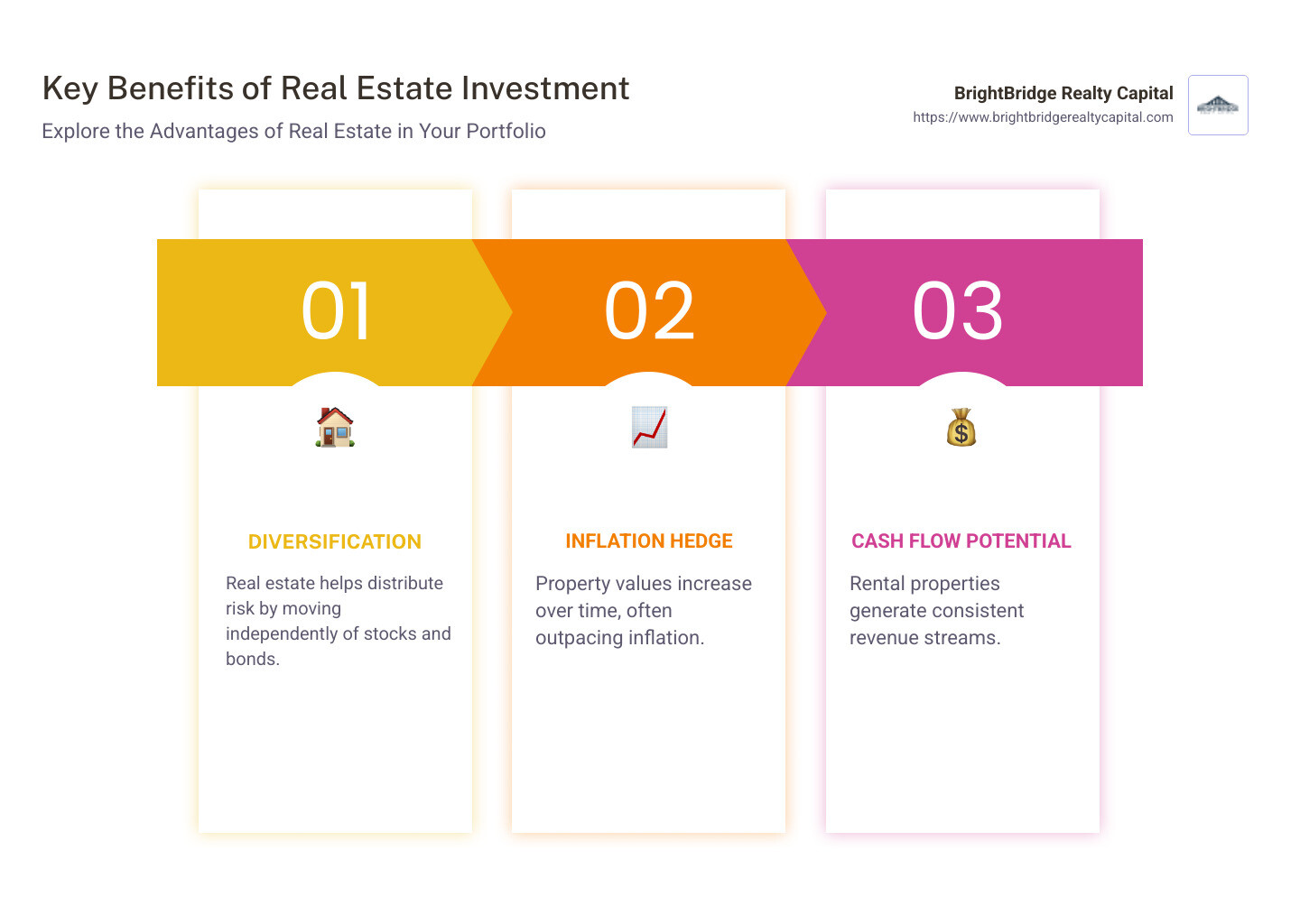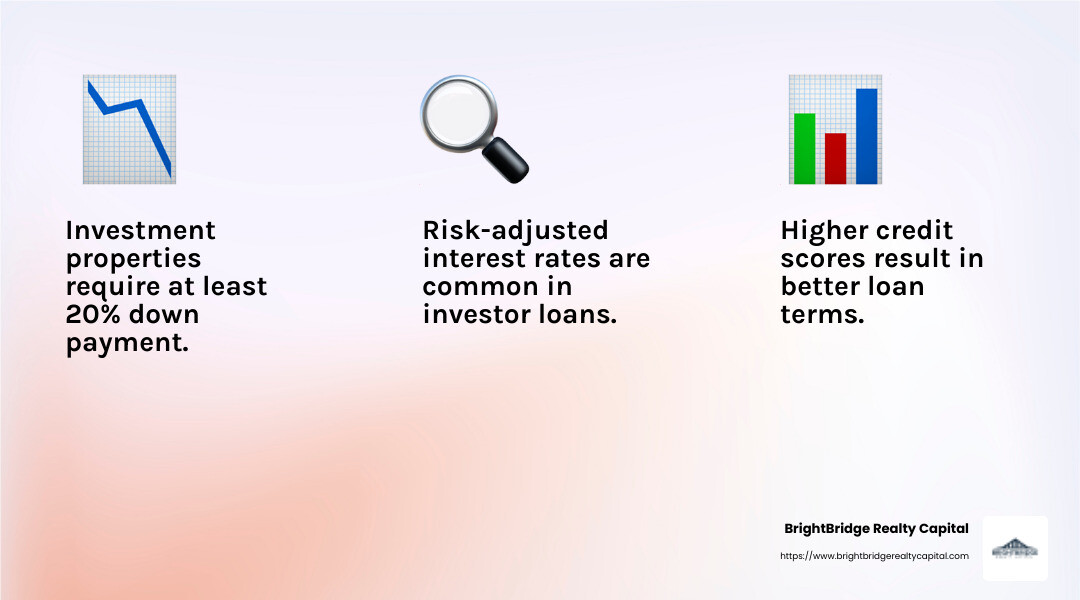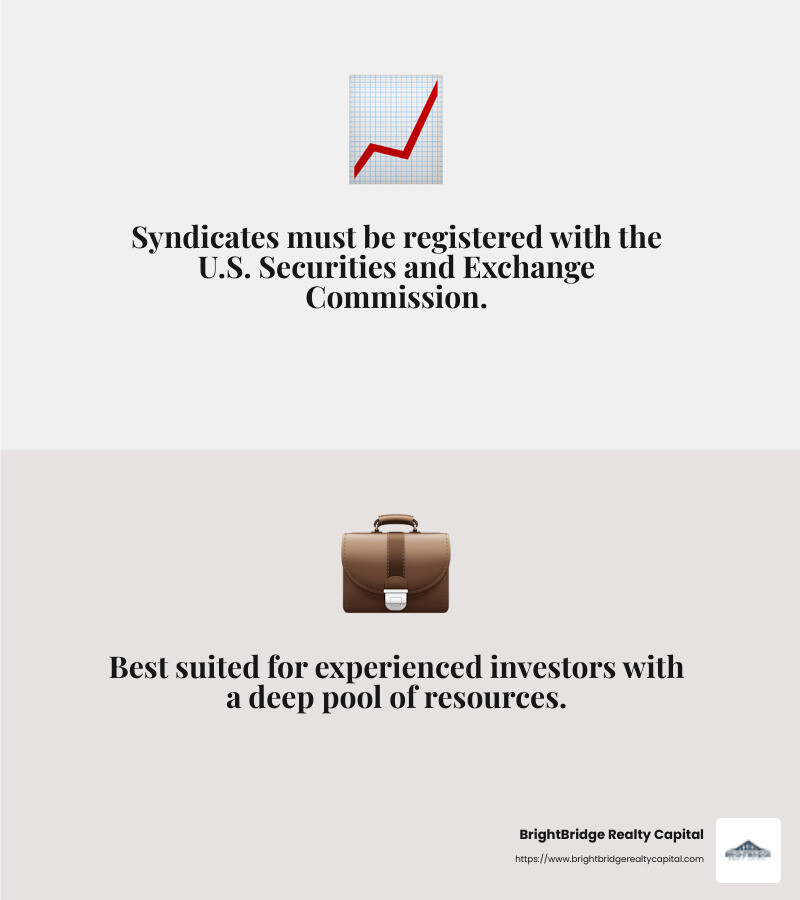Financing Your Future: Real Estate Investment Options

Investor real estate financing is essential for those looking to expand their investment horizon. Whether it's for diversification, hedging against inflation, or tapping into the potential for steady cash flow, investing in real estate can offer tremendous opportunities. Here's why it's important:
Diversification: Adding real estate to your investment portfolio helps distribute risk. Real estate values often move independently of stocks and bonds, providing a buffer during market downturns.
Inflation Hedge: Real estate investments historically appreciate at a rate that outpaces inflation. This means your property's value and the rent you can charge may increase over time, protecting and growing your wealth.
Cash Flow Potential: Rental properties can generate consistent revenue streams. This income can help cover mortgage payments, maintenance, and still leave room for profit.
Real estate presents a unique opportunity for investors keen on stable growth and financial security.

Learn more about Investor real estate financing:
Understanding Investor Real Estate Financing
When diving into investor real estate financing, it's crucial to understand that the rules of the game differ from those for personal home loans. Let's break down the key aspects you need to know:
Higher Down Payments
Investing in real estate usually means preparing for a larger down payment. Unlike traditional home loans, where you might get away with putting down as little as 3% to 5%, investment properties often require at least 20% or more. This higher initial outlay is due to the perceived risk by lenders. They want to ensure that you have enough skin in the game to stick around for the long haul.
Stricter Credit Requirements
Getting a loan for an investment property isn't just about having the cash on hand. Lenders will scrutinize your credit history more closely than they would for a primary residence. Expect to need a higher credit score to qualify. Generally, a score of 620 or higher is a good starting point, but the better your score, the better your loan terms will likely be. Improving your credit score can save you thousands in interest over the life of a loan.

Risk-Adjusted Interest Rates
Interest rates for investment properties are typically higher than those for primary residences. This is because lenders see investment properties as riskier. They adjust interest rates to compensate for this risk, which means you'll pay more over time compared to a mortgage on a home you live in. Rates can be anywhere from 0.25% to 0.75% higher, which can add up significantly over the years.
Pro Tip: To minimize your interest costs, improve your credit score and consider paying points upfront to lower your rate.
Understanding these elements is crucial when considering investor real estate financing. Preparing for higher down payments, ensuring your credit is in top shape, and being ready for higher interest rates are all part of the process. With the right planning and strategy, you can steer these challenges and leverage real estate investments to build wealth.
Types of Investment Property Loans
When it comes to investor real estate financing, choosing the right type of loan is crucial. Each option has its unique features, advantages, and considerations. Let's explore the most common types of investment property loans.
Conventional Loans
Conventional loans are the most popular choice for investors. These loans are provided by private lenders and conform to guidelines set by Fannie Mae and Freddie Mac. They typically require:
- Higher down payments: At least 20% is standard for investment properties.
- Stricter credit requirements: A minimum credit score of 620, though higher scores can secure better terms.
- Risk-adjusted interest rates: Expect rates to be 0.25% to 0.75% higher than those for primary residences.
Conventional loans are ideal for stable, long-term investments where you plan to hold and rent the property.
Hard Money Loans
Hard money loans are short-term loans offered by private investors or companies. They're secured by the property itself, making them less reliant on your credit score. Key points include:
- High interest rates: Typically much higher than conventional loans.
- Short-term duration: Usually 1 to 5 years, perfect for quick flips.
- Fast approval: Ideal for investors who need to move quickly on a property.
These loans are best for investors looking to flip properties or those who need quick, temporary financing.
Private Money Loans
Private money loans come from personal connections, like family or friends, rather than traditional lenders. They offer:
- Flexibility: Terms can be negotiated to suit both parties.
- Personal risk: Potential strain on relationships if things go south.
While private money loans can be a great option, they require clear agreements to avoid misunderstandings.
Home Equity Loans and HELOCs
If you already own a home, you can leverage your existing equity through a home equity loan or a Home Equity Line of Credit (HELOC).
- Home Equity Loan: Provides a lump sum with fixed interest rates.
- HELOC: Functions like a credit card with variable rates, allowing you to borrow as needed.
Both options can be risky, as your home is on the line if you default. However, they offer a way to fund investment properties without selling your primary residence.

Choosing the right loan is a critical step in your real estate investment journey. Each type has its pros and cons, so consider your investment strategy, risk tolerance, and financial situation before making a decision. With the right loan, you can leverage your investments to create wealth and achieve your financial goals.
Creative Financing Strategies
When it comes to investor real estate financing, creative strategies can be a game changer. They offer flexibility and opportunities for those who might not fit the mold of traditional lending. Let's explore some popular creative financing strategies: seller financing, crowdfunding, and syndicates.
Seller Financing
In seller financing, the property seller acts as the bank, allowing the buyer to make payments directly to them. This can be a win-win:
- Faster transactions: Without the bank's involvement, deals can close more quickly.
- Flexibility: Terms can be custom to suit both parties' needs.
However, there are risks. Buyers might default, and standard mortgage protections aren't in place. Legal counsel is crucial to steer these deals, so expect some upfront legal costs.
Crowdfunding
Crowdfunding pools resources from multiple investors to fund real estate projects. It's like a cooperative investment:
- Lower individual capital: You can invest in large projects with a smaller personal outlay.
- Diversification: Spread risk across various properties.
But, it's not without its challenges. Managing multiple investors can be complex, and regulatory problems exist. Syndicates, for example, must be registered with the U.S. Securities and Exchange Commission.
Syndicates
Syndicates are partnerships formed to invest in real estate. Here's what you need to know:
- Experienced investors only: Due to complexity, it's best for those with a deep pool of resources.
- Legal structure: Syndicates must be registered entities, which involves legal and regulatory compliance.
In a syndicate, a sponsor identifies properties and manages the investment, while passive investors provide capital. It's a way to access large-scale investments and share the benefits and risks.

These creative strategies offer alternative paths for real estate investment. Whether you're looking for flexibility, lower individual capital requirements, or access to larger projects, there's a strategy to fit your needs. Just remember, each option comes with its own set of risks and benefits.
Benefits of Real Estate Investment
Investing in real estate offers several benefits that can improve your financial portfolio. Let's explore some key advantages: steady cash flow, property appreciation, tax benefits, and portfolio diversification.
Steady Cash Flow
Owning rental properties can provide a consistent income stream. When you invest in a property located in a desirable market, it often leads to steady rental income. This income helps cover mortgage payments and other expenses. Plus, it can offer passive income with minimal daily effort.
Property Appreciation
Real estate has a history of increasing in value over time. For instance, since 1963, U.S. home prices have risen by an annualized rate of over 5.5%, outpacing inflation. This appreciation means that your property could be worth significantly more in the future, adding to your overall wealth.
Tax Benefits
Real estate investors enjoy several tax advantages. You can deduct mortgage interest, depreciation, maintenance costs, and property taxes. These deductions lower your taxable income. Additionally, strategies like 1031 exchanges allow you to defer capital gains taxes when you sell a property and reinvest in another.
Portfolio Diversification
Real estate provides a way to diversify your investment portfolio beyond stocks and bonds. Real estate values often move differently than stock prices, potentially gaining value during stock market downturns. This diversification can help stabilize your overall investment returns.
These benefits make real estate a compelling option for investors looking to grow their wealth and secure their financial future. With the right strategy, you can harness these advantages to build a robust investment portfolio.
Frequently Asked Questions about Investor Real Estate Financing
When diving into investor real estate financing, you might have questions about the best loan options, how to secure financing with minimal upfront costs, and what lenders look for. Let's tackle these common queries.
What type of loan is best for investment property?
Choosing the right loan depends on your investment goals and financial situation. Here are three common options:
Fixed-Rate Mortgages: These loans offer stability with constant interest rates and monthly payments. They're ideal if you want predictable expenses over the long term. This consistency can be a great advantage if you plan to hold onto the property for many years.
Adjustable-Rate Mortgages (ARMs): ARMs start with lower interest rates that adjust over time. They can be attractive if you plan to sell or refinance before the rates increase. However, they carry the risk of higher payments if you keep the property long-term.
Jumbo Loans: If you're eyeing a high-value property, a jumbo loan might be necessary. These loans exceed the conforming loan limits set by Fannie Mae and Freddie Mac. They require higher credit scores and larger down payments but offer access to luxury real estate markets.
How to get a loan for a rental property with no money down?
While most investment property loans require significant down payments, there are ways to minimize upfront costs:
FHA Loans: Though primarily for primary residences, you can use an FHA loan to buy a multi-unit property, live in one unit, and rent out the others. This strategy, known as house hacking, allows you to benefit from lower down payments.
VA Loans: For eligible veterans and active-duty service members, VA loans offer no down payment options. You can use these to buy multi-unit properties, provided you live in one of the units.
What are the requirements for investment property loans?
Lenders have stricter criteria for investment properties compared to primary residences. Here's what they'll typically assess:
Credit Score: A higher credit score is essential. Most lenders prefer scores above 700, but having a stellar score can secure better rates and terms.
Down Payment: Expect to put down at least 20% of the property's purchase price. Some lenders might require more, especially for properties with multiple units.
Cash Reserves: Lenders often require you to have 6-12 months of mortgage payments in reserve. This ensures you can cover payments during vacancies or other financial hiccups.
Understanding these elements can help you steer the financing landscape and secure the best loan for your investment property. With the right preparation, you can make informed decisions and move confidently toward your real estate investment goals.
Conclusion
At BrightBridge Realty Capital, we understand that time is money in real estate investment. That's why we offer fast closings and direct lending solutions to help you seize opportunities without delay. Our streamlined process means you can often close within a week, allowing you to act quickly in a competitive market.
Our competitive rates set us apart. By eliminating intermediaries, we provide direct access to financing, ensuring you get the best terms possible. This approach not only saves you money but also simplifies the borrowing experience, making it easier for you to focus on what matters most—growing your investment portfolio.
Whether you're a seasoned investor or just starting, our customized financing solutions are designed to meet your specific needs. We believe in empowering investors with the tools and resources they need to succeed in the real estate market.
Explore our loan options and find how BrightBridge Realty Capital can help you finance your future. With our expertise and commitment to excellence, you can trust us to be your partner in real estate investment.


